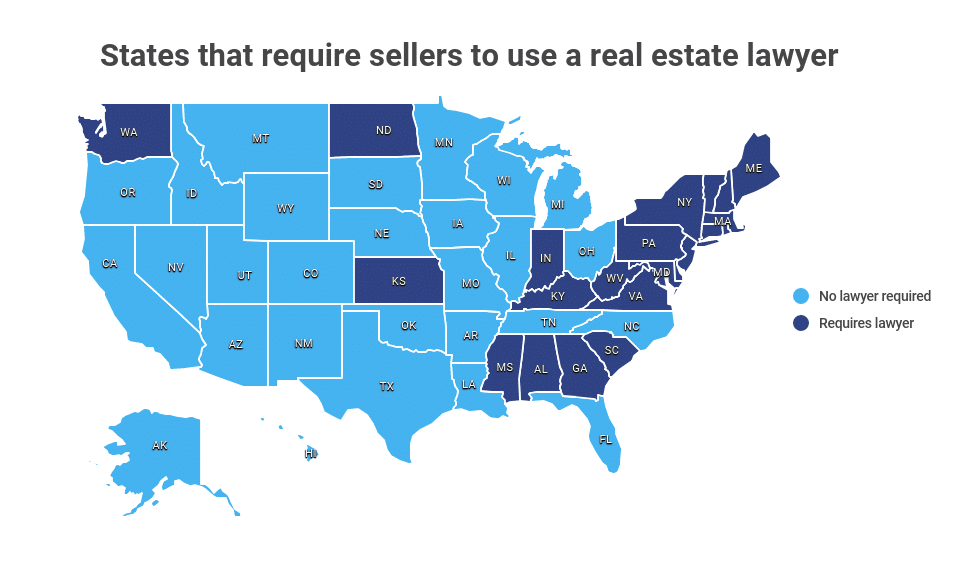If you’re considering selling your house, you might be wondering, “Do I need a real estate attorney to sell my house?” The process of selling a house can be complex, with legal considerations and paperwork that need to be handled accurately. While it may not be a legal requirement to hire a real estate attorney, having one by your side can offer valuable guidance and protection throughout the transaction.
In this article, we’ll explore the benefits of hiring a real estate attorney, how they can assist you during the selling process, and what factors you should consider when deciding whether or not to enlist their services. So before you embark on the journey of selling your house, let’s explore whether or not a real estate attorney is a necessary ally for this important endeavor.

This image is property of www.realestatewitch.com.
Pros and Cons of Hiring a Real Estate Attorney
Selling a house can be a complex and high-stakes endeavor, involving legal considerations that can have significant financial and legal consequences. While it is not a legal requirement to hire a real estate attorney when selling your house, there are several advantages and disadvantages to consider when making this decision.
Advantages of Hiring a Real Estate Attorney
- Expert Legal Guidance: One of the biggest advantages of hiring a real estate attorney is the access to expert legal advice and guidance throughout the selling process. A real estate attorney specializes in the laws and regulations surrounding property transactions, and they can provide valuable insights and assistance to ensure that your sale is legally sound.
- Mitigation of Legal Risks: Selling a house involves various legal risks, such as potential breaches of contract, disputes over property boundaries, or undisclosed defects in the property. A real estate attorney can help you identify and mitigate these risks, reducing the likelihood of legal issues arising in the future.
- Negotiation Representation: A skilled real estate attorney can negotiate on your behalf during the selling process, helping you secure the best possible terms and conditions for your sale. They can also review and advise on offers and contracts, ensuring that your interests are protected.
- Title Search and Issue Resolution: A real estate attorney will conduct a thorough title search to ensure that the property is free from any liens, encumbrances, or title defects that could affect the sale. If any issues arise, the attorney can work to resolve them, providing you with peace of mind and a clear title for the buyer.
- Legal Compliance and Disclosures: Selling a house involves complying with numerous legal requirements and making specific disclosures to potential buyers. A real estate attorney can assist you in meeting these obligations, ensuring that you fulfill all necessary legal requirements and protect yourself from potential litigation.
Disadvantages of Hiring a Real Estate Attorney
- Additional Cost: Hiring a real estate attorney is an added expense in the selling process. While their expertise can be invaluable, it is essential to consider the financial implications and weigh them against the potential benefits.
- Limited Scope of Services: Some homeowners may feel that the services provided by a real estate attorney are not worth the cost, especially if they have a knowledgeable real estate agent guiding them through the process. In such cases, the expertise of a real estate attorney may not be necessary.
- Time Commitment: Collaborating with a real estate attorney requires time and effort, as you will need to provide them with all the necessary information and documents relating to the property sale. This can be challenging for sellers who have busy schedules or limited availability.
Understanding the Role of a Real Estate Attorney
Before deciding whether or not to hire a real estate attorney, it is important to understand their role and the value they can bring to the selling process.
What Does a Real Estate Attorney Do?
A real estate attorney specializes in the legal aspects of property transactions. They can provide advice, draft and review legal documents, conduct title searches, negotiate on your behalf, address any contingencies or potential disputes, and ensure legal compliance throughout the selling process. Essentially, they act as your legal representation, protecting your interests and ensuring that your sale is legally sound.
The Importance of Legal Expertise in Real Estate Transactions
Real estate transactions involve complex legal considerations, including contract law, property law, and local regulations. Without expert legal guidance, sellers risk making mistakes, overlooking important legal requirements, or leaving themselves vulnerable to costly legal disputes. A real estate attorney’s specialized knowledge and experience can help navigate these complexities and ensure that your sale proceeds smoothly and securely.
When Should I Consider Hiring a Real Estate Attorney?
While hiring a real estate attorney is not necessary for every property sale, there are certain situations where their expertise becomes invaluable. Consider the following scenarios to determine if hiring a real estate attorney is the right choice for you.
Complexity of the Sale
If your property sale involves unique or complicated circumstances, such as multiple owners, commercial property, or the presence of tenants, hiring a real estate attorney is highly recommended. Their expertise in handling complex transactions can help ensure that all legal aspects are appropriately addressed and resolved.
Legal Concerns and Risks
If you have concerns about potential legal issues or risks associated with your property sale, it is advisable to consult with a real estate attorney. They can help identify and mitigate any legal pitfalls, assess your liabilities, and protect your interests throughout the selling process.
For Sale by Owner (FSBO) Transactions
Selling a house without the assistance of a real estate agent, commonly known as a For Sale by Owner (FSBO) transaction, may benefit from the guidance and expertise of a real estate attorney. Since you will be responsible for navigating the legal intricacies of the sale, having an attorney by your side can ensure that you adhere to all legal requirements and effectively manage legal risks.
Uncommon Situations or Special Circumstances
If your property sale involves uncommon situations or special circumstances, such as selling an inherited property, dealing with a trust, or going through a divorce, a real estate attorney can provide the necessary expertise and legal support specific to those circumstances. They can ensure that all legal requirements are met and that your interests are protected in these unique situations.
Finding a Real Estate Attorney
Once you have decided to hire a real estate attorney, the next step is to find a qualified professional who can meet your needs. Here are some strategies to help you find the right attorney for your property sale.
Researching and Evaluating Attorneys
Start by conducting thorough research to identify real estate attorneys in your area. Look for attorneys who specialize in real estate law and have relevant experience in handling property transactions. Read client reviews, check their credentials and qualifications, and evaluate their expertise in the specific areas of law that pertain to your sale.
Referrals and Recommendations
Seek recommendations from people you trust, such as friends, family, or colleagues who have recently sold their properties. Personal referrals can provide valuable insights into an attorney’s professionalism, knowledge, and ability to effectively handle property transactions.
Local Bar Associations and Online Directories
Contact your local bar association or utilize online directories to find real estate attorneys in your area. These resources often provide detailed information about an attorney’s practice areas, experience, and contact information, making it easier for you to shortlist potential candidates.
Initial Consultation and Interviewing Potential Attorneys
Once you have identified a few potential real estate attorneys, schedule initial consultations to discuss your property sale and gauge the attorney’s compatibility with your needs. Prepare a list of questions to ask during these consultations to assess their approach, communication style, and how well they understand your concerns and objectives.
Considering the Attorney’s Experience and Specialization
When selecting a real estate attorney, experience and specialization are crucial factors to consider. Look for an attorney who has significant experience in handling property sales similar to yours and is well-versed in the specific laws and regulations relevant to your location. A specialized attorney will have a deeper understanding of the intricacies involved in your sale and can provide more targeted guidance.

This image is property of www.realestatewitch.com.
Costs Associated with Hiring a Real Estate Attorney
While hiring a real estate attorney involves additional costs, it is essential to understand the various expenses associated with their services.
Attorney Fees and Billing Structure
Real estate attorneys typically charge for their services on an hourly basis or a flat fee, depending on the complexity of the sale and the attorney’s billing structure. Hourly rates can range from $150 to $500 per hour, depending on the attorney’s experience and reputation. Flat fees are common for standard real estate transactions and can range from a few hundred to a few thousand dollars.
Additional Expenses and Disbursements
In addition to attorney fees, there may be additional expenses and disbursements associated with your property sale. These can include title searches, recording fees, courier charges, document preparation costs, and other third-party expenses incurred during the process. Make sure to discuss these potential expenses with your attorney upfront to understand the full scope of costs involved.
Comparing Costs and Getting a Clear Fee Agreement
To ensure transparency and avoid any surprises, it is crucial to have a clear fee agreement with your real estate attorney. Request a detailed breakdown of costs and discuss the estimated total expense for your property sale. While it is essential to consider costs, remember that the experience and expertise of a skilled attorney can provide significant long-term benefits and potentially save you money by preventing legal disputes.
The Real Estate Attorney’s Role in the Selling Process
A real estate attorney plays a crucial role throughout the selling process, providing valuable guidance and support. Here are some key responsibilities that a real estate attorney typically undertakes to ensure a successful sale.
Reviewing and Drafting Legal Documents
One of the primary responsibilities of a real estate attorney is to review and draft legal documents related to the property sale. This includes contracts, agreements, addendums, disclosure statements, and any other legally binding documents involved in the transaction. Their expertise ensures that these documents comply with applicable laws and adequately protect your interests.
Title Search and Title Issues
Conducting a comprehensive title search is an integral part of the selling process, and a real estate attorney will take care of this crucial step. They will ensure that the property’s title is clear and free from any liens, encumbrances, or other issues that could affect the sale. If any title issues arise, the attorney will work to resolve them, providing you with the necessary legal support.
Negotiating and Advising on Contracts and Offers
A real estate attorney can serve as your negotiation representative, advising you on offers and contract terms and working to secure the best possible outcome for your sale. They can also assist in crafting counteroffers and guiding you through the negotiation process to protect your interests.
Assistance with Seller Disclosures and Legal Compliance
Complying with legal requirements and making necessary disclosures to potential buyers is a critical aspect of selling a house. A real estate attorney can ensure that you fulfill all necessary obligations and provide guidance on what information needs to be disclosed to avoid any potential legal issues or disputes.
Addressing Contingencies and Potential Disputes
Contingencies, such as inspections, financing, or additional requests from the buyer, can arise during the selling process. A real estate attorney can review and advise on these contingencies, helping you navigate potential disputes and ensuring that your interests are protected.
Finalizing the Closing Process
The closing process is the final step in a property sale, and a real estate attorney will oversee this crucial phase. They will review closing documents, ensure that all necessary paperwork is in order, and represent your interests during the closing meeting. Having an attorney present can provide peace of mind and help expedite the process.

This image is property of na.rdcpix.com.
Legal Risks When Selling a House Without an Attorney
Opting to sell a house without the assistance of a real estate attorney exposes you to potential legal risks. Here are some of the risks associated with selling a house without legal representation.
Potential Legal Pitfalls and Consequences
Without expert legal guidance, sellers may inadvertently overlook or misunderstand legal requirements, leading to potential legal pitfalls. These pitfalls can result in costly consequences, such as breached contracts, disputes with buyers, or even litigation. A real estate attorney’s expertise can help you navigate these risks and avoid these potential pitfalls.
Liability Issues
Sellers are responsible for providing accurate and complete disclosures about the property they are selling. Failure to do so can result in legal liabilities and potential lawsuits from buyers. A real estate attorney can help ensure that you fulfill your disclosure obligations and minimize the risk of legal complications.
Protecting Your Interests as a Seller
Selling a house is a significant financial transaction, and it is essential to protect your interests throughout the process. Without legal representation, sellers may face challenges when negotiating with buyers, handling contingencies, or understanding complex legal documents. A real estate attorney can advocate on your behalf and ensure that you are well-informed and protected throughout the selling process.
How to Sell a House without an Attorney Safely
While it is generally advisable to seek legal guidance when selling a house, there are ways to sell a house without an attorney if you take certain precautions. Here are some steps to help ensure a safe and successful sale without legal representation.
Researching Local Real Estate Laws
Before proceeding with a sale without an attorney, thoroughly research the real estate laws and regulations specific to your area. Familiarize yourself with the legal requirements, disclosure obligations, and any specific considerations that may apply to your sale.
Educating Yourself on the Selling Process
Gain a comprehensive understanding of the selling process by educating yourself on the common steps, documentation, and legal requirements involved. Utilize reputable online resources, books, or local seminars that provide insights into the process.
Working with a Title or Escrow Company
Consider working with a reputable title or escrow company to handle the closing process and title transfer. These professionals specialize in managing the legal and financial aspects of property transactions and can ensure that all necessary documentation and payments are handled correctly.
Hiring a Real Estate Agent to Assist with Non-legal Tasks
If you choose not to enlist the services of a real estate attorney, you can still work with a real estate agent to handle certain non-legal aspects of the sale. An experienced agent can help market your property, negotiate with buyers, and guide you through the selling process while adhering to legal obligations.
Consulting with a Real Estate Attorney for Limited Scope Representation
If you are confident in handling the majority of the selling process but still have concerns or questions about specific legal aspects, you can consult with a real estate attorney on a limited scope basis. This means engaging their services for specific tasks, such as contract review or to address legal concerns that arise during the sale.

This image is property of res.cloudinary.com.
Conclusion
Selling a house is a significant financial transaction that involves complex legal considerations. While it is not mandatory to hire a real estate attorney, their expertise can provide valuable guidance, mitigate legal risks, and protect your interests throughout the selling process. By understanding the advantages and disadvantages of hiring a real estate attorney and considering your specific circumstances, you can make an informed decision to ensure a successful and legally sound property sale. Remember to research, evaluate, and collaborate with professionals who can help you navigate the intricacies of the selling process and safeguard your interests as a seller.
